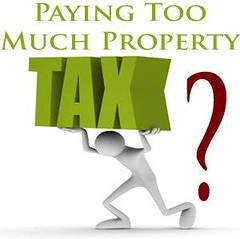So TReXGlobal.com has provided an updated 2012 Tax Planning Guide that provides specific tax strategies to consider as 2012 draws to close. Landlords, Rental Property Owners and Vacation Property Owners can keep more money in their pocket by taking advantage of available tax benefits and by tapping into new tax saving opportunities.
Take action now to SAVE on taxes! ACT BEFORE DECEMBER 31, 2012
Download Year End Tax Guide
Follow these top year-end tax tips and strategies for rental property owners.
| (Photo credit: danielmoyle) |
Income timing is a time-honored year end plan. In future, tax rates are expected to increase from current historical low rates. If you expect rates to go up it might be better to accelerate income by receiving by January rental income in December. Income timing is not easy and you should consider its impact on various deductions.
2. Accelerate Rental Expenses
There are many different types of expenses that can be accelerated to reduce rental income for the year. You can purchase goods and services needed for the rental property business, and pay the bills early. Qualifying expenses include advertisements for vacancies, printing, association memberships, business insurance, seminar fees, education courses, cell services, subscriptions, insurance, and utilities. You can also stock up on any office supplies, like printer paper and ink cartridges.
Interest is generally one of the largest deductible expenses – so you can prepay the January mortgage payment to increase your interest expense for the current year.
If you have employees that you pay for your rental business, prepay the withheld Social Security, Medicare, and unemployment taxes.
3. Harvest Capital Gains or Losses
The low 15 percent federal long term capital gain has been extended through 2012. Consider tax loss harvesting to offset any current year gains or to accumulate losses to offset future capital gains that would be taxed at higher rates.
4. Employees Health Insurance Credit
You can deduct the cost of health insurance for any employees of your rental business. Take advantage of the health insurance credit, which provides a credit worth up to 35% of premium costs in 2012.
5. Claim Home Office, Workshop, Garage Deduction
If requirements are met, this is one of the best deductions as it enables conversion of non-deductible personal expense into a tax-deductible rental business expense.
Besides deducting expenses for use of space at home for office work, you can deduct space used as work- shop for rental business. If you use your garage to store your tractor to cut grass or to hold furnishings, you can deduct expense for its use.
6. Hire Your Children and Put the Earned Money in IRA
Consider hiring your children to work for your rental business part-time. Deduct their compensation and it is likely you will be moving the income from high tax bracket to lower tax bracket.
In addition, unincorporated businesses do not pay FICA tax on wages paid to children under 18. Put the money earned in IRA account for them. It is a great way to move money into account where it can grow faster through tax deferral.
7. Casualty, Disaster Losses
Losses experienced by rental business due to casualty, disaster or theft may be tax deductible. If your rental business experienced a casualty or disaster loss, use the loss to your benefit. Do not forget to take the casualty and theft losses because of theft, floods, etc.
8. Claim Your Automobile Expenses
Automobile expenses paid exclusively for your rental business can be fully deductible. You can select either the actual expenses method instead of standard mileage if the automobile incurred lot of expenses in 2012.
9. Claim Your Travel and Entertainment Expenses
Deduct travel and entertainment expenses incurred when traveling for your rental business. If you travel overnight for your rental business, deduct your airfare, hotel bills, meals and other expenses.
10. Expense Repair Costs
Remember that repairs are expensed in the year that they occur while improvements are depreciated. Deduct the full cost of repairs that are necessary to keep your property in good working condition like fixing broken windows, gutters, leaks, locks, painting rooms, plastering, etc. Bonus Tips
1. Increase Rental Property Asset Depreciation Expense
Identify your rental property’s short life assets to depreciate them faster. Assets like air conditioners, refrigerator, carpets, clothes dryer, etc can be depreciated over 5-year life while fences, patio, sidewalk, etc can be depreciated over 15 years. By separating assets and depreciating them separately, deductions are taken sooner.
2. Exclude Rental Income
If you rented your vacation home or home for less than 15 days, you can exclude the rental income on your tax return. In order to avail this tax benefit, the vacation home has to be considered a residence. In order for the property to be considered a residence, you or your family member have to use the home for 15 days at least. You may not be able to deduct any rental expenses but you can deduct interest, property taxes if you itemize deductions.
3. Installment sale
The low 15 percent federal long term capital gain has been extended through 2012. If you had sold a property on installment sale consider options of triggering a gain on the contract so that you lock into the low 15 percent capital gain rate.
Remember to take action before December 31, 2012!
Download Year End Tax Guide
Everyone’s tax situation is different, and this information should not substitute professional advice. Landlords, Real Estate Investors and Vacation Home Owners should always consult with their tax advisors to consider specific factors that might affect their situation.
By Property Management Software
Taken from: http://www.trexglobal.com/property-management/featured/2012-year-end-tax-planning-guide-for-landlords-real-estate-investors-vacation-home-owners






No comments:
Post a Comment